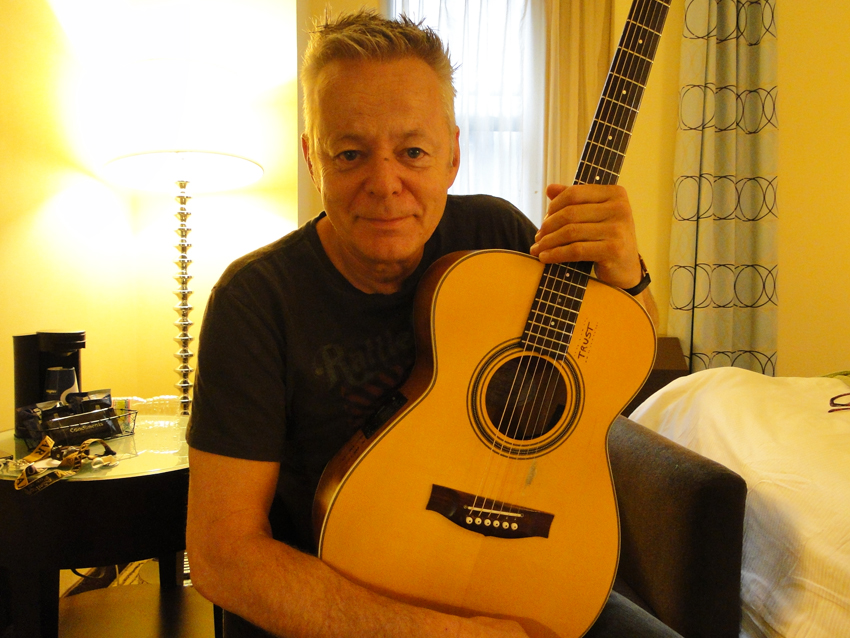
The term "best-kept-secret" is one that has been applied to guitarist Tommy Emmanuel for years. But lately that's changing: His jaw-dropping acoustic prowess, one which prompted his idol and mentor, Chet Atkins, to bestow on Emmanuel the rare title of Certified Guitar Player (CGP) in 1999, is reaching mainstream ears. Emmanuel's 2010 release, Little By Little, a double disc of goodness, has become one of his biggest sellers, and his current world tour is a sell-out success.
We caught up with the Australian-born Emmanuel in New York City recently to talk about how he developed his highly distinctive playing style, his association with Atkins, what he looks for when choosing a cover tune, and in the video above, his love of Maton Guitars (he has several signature models).
For most guitarists, choosing the right instrument is no small matter. But I imagine with you, it's of paramount importance.
"Absolutely. People always ask me, 'What's the best guitar in the world?' And I tell them, 'The best guitar in the world is the one that you don't want to put down. It's the one you want to play until you die.' It is a special matter. The right guitar is the one that makes you feel as though you've found your voice.
"My guitars, the guitars that I've used for years, Maton Guitars, are made in Australia. I have an exclusive deal with them, but I don't play these guitars because they pay me money. If you go back to photos of me in 1959, you'll see I'm holding a Maton - that's how long I've played them.
"It's not that I'm patriotic or anything. To me, nobody makes a guitar that feels and sounds as good as this one. The pickup and mic system is unequalled. As much as I admire Lloyd Baggs and James Fishman - and they're friends of mine; I admire their work - nobody's come up with a pickup like the Maton pickup. So many people say, 'You should play in this hall or that hall because the acoustics are good.' And I say, 'It doesn't matter. If the electrics in the guitar are good and there's a good PA system, I'm going to get a great sound."
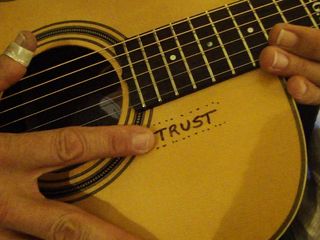
Trust. It's a word Emmanuel doesn't take lightly.
Get the MusicRadar Newsletter
Want all the hottest music and gear news, reviews, deals, features and more, direct to your inbox? Sign up here.
However, when you record in the studio, what kind of miking setup do you use? And does the tracking room matter at all to you?
"Well, when I record acoustic guitar, I do away with the room. I put baffles around me and isolate the guitar, so it's right there. I still take a line-out and play through an amp, so when you hear my recordings, you're hearing anywhere up to 12 channels for one guitar sound.
"I could use anywhere between two and four microphones, plus the mic in the guitar, plus the pickup, plus the amp - and a direct signal. I'm using every available frequency that I can, although I still get a great sound just by sticking a mic right in front of it.
"When you hear the sound of my recordings, basically you're hearing mostly acoustic. It's just about all microphone, with a tiny bit of the amp and a direct signal, and what I do is I leave the microphones dry and un-EQ'd. We put a little bit of the room sound and the amp signal in behind. So it's a bit of an illusion, but it's nice to mix it up."
A signature style is such an elusive thing. So many strive for it, so few achieve it. How did it all come together for you?
"The evolution of my playing, which is ongoing, started a long time ago, when I first heard Chet Atkins, and then I heard Jerry Reed and George Benson. But it was Chet's arrangements, his sounds and ideas, his way of playing melodies, it influenced me in every way. It affected the way I heard music and how I approached the instrument.
"I even did a lot of work on experimenting with different strings, vibratos, picks - with picks, I went from a Fender medium to Fender heavy to extra heavy to you-must-be-joking. [laughs] That's a big part of my sound, too.
"Some of the other aspects of my playing, they all come from the way I hear music. I move bass notes around with my thumb, and that came from experimenting. I'm just being myself. That's a very important thing, really. You can be influenced, sure, but you have to play guitar the way you want to play it."
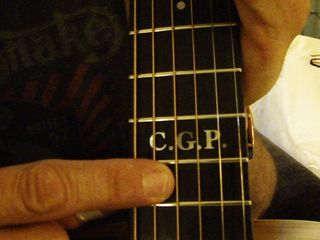
CGP. Emmanuel is only one of four guitarists (including Jerry Reed, John Knowles and Steve Wariner) to bear the title.
You got to record with Chet Atkins on what would be his last record [1997's The Day Finger Pickers Took Over The World]. What was that like?
"Oh, it was beautiful. We didn't know it would be his last record, of course. But it was a dream come true for me to work with him. I'll tell you, he was old by then, and he had been sick so much, but he was a tough guy. He was tired of being sick. He wanted to get out and play more. He had cancer five times, can you believe it? The hospital that saved his life the last time gave him the Old Hickory Award. They said, 'You're as tough as this piece of hickory wood.'
"Working with him, it's funny - I was never intimidated by him, but I did idolize him. I was always very careful how far I could go on things. When we did pre-production, we had laid out some things, but then he said, 'You go ahead and take the helm, because I'm not feeling so good.' He virtually handed the album to me, so I did pull in some people and I overdubbed some things on my own. But there were a few tracks where the two of us sat together, just inches apart, and we played. We did them in one take, too. It was brilliant."
Is it possible for the fan to ever leave when you're working with somebody you admire so much?
"No, the fan never leaves, but my position was that I was there to do the best job that I could for him and for me in that situation. I've never really talked about this, but it's the only album of his where there's no producer. I did everything. But I certainly wasn't going to approach him when he was ill and at the end of his life to say, 'Hey Chet, can I have a producer's credit?' I never would have done that."
At what point did he bestow the title of Certified Guitar Player upon you?
"That happened in '99. We made the album in '96, and we decided that we were going to work together, and we were going to re-launch him to the world. We hired a publicist together, split the costs of everything, joined our business heads together and our mojo thing. We basically joined forces.
"I did some TV shows with him, and the record company started to get very excited: Here's this boy from nowhere who gets to make an album with this giant. This was our story. But, unfortunately, Chet got a brain tumor, and when he came out of the hospital he had limited motor skills. He could still play, but not like he used to. It was difficult. It would have been too much to continue. So we had to nip everything in the bud.
"The last time we played together was in 2000, and it was literally days later that he couldn't play anything. That was at the Chet Atkins Convention. But he bestowed on me the CGP in '99, and I… I didn't know what to say. I just didn't expect it. Friends of his, who knew him way better than I did, said, 'Oh my God, he did that in public. That means a lot. That's something important.'
"I've come to realize that it's not just some kind of honor, or a torch that was passed on to me. It's a responsibility, and it's one I take very seriously."
Your last album, Little By Little, came out in 2010. Are you working on a new one?
"I am, but unlike Little By Little, I want it to be purely solo. So I will be doing that. But the other thing is, I've just started a record of duets with Martin Taylor, and it's real jazz. It's going to have some wonderful standards on it. That's for this year."
Speaking of covers, you've done some great ones - Over The Rainbow comes to mind as a standout. Others, like James Taylor, have done beautiful versions of that, too. What is it about that song that speaks to musicians so?
"It's one of the greatest jewels on the planet. Like the songs Mona Lisa and Imagine, they mean a lot to people, and they mean a lot to people anywhere in the world. They're messages that touch people, and that's something worth doing. That's what I look for when I choose a song to cover.
"When I do a song like Over The Rainbow, I try to be as true to the melody as possible. I try to play it like I'm Judy Garland singing it. I don't try to 'do guitar' on it. I could try to be clever and throw in a bunch of chords and things, but that's missing the point. A song like that is timeless, so I'm just continuing the message in my own way."
Joe is a freelance journalist who has, over the past few decades, interviewed hundreds of guitarists for Guitar World, Guitar Player, MusicRadar and Classic Rock. He is also a former editor of Guitar World, contributing writer for Guitar Aficionado and VP of A&R for Island Records. He’s an enthusiastic guitarist, but he’s nowhere near the likes of the people he interviews. Surprisingly, his skills are more suited to the drums. If you need a drummer for your Beatles tribute band, look him up.
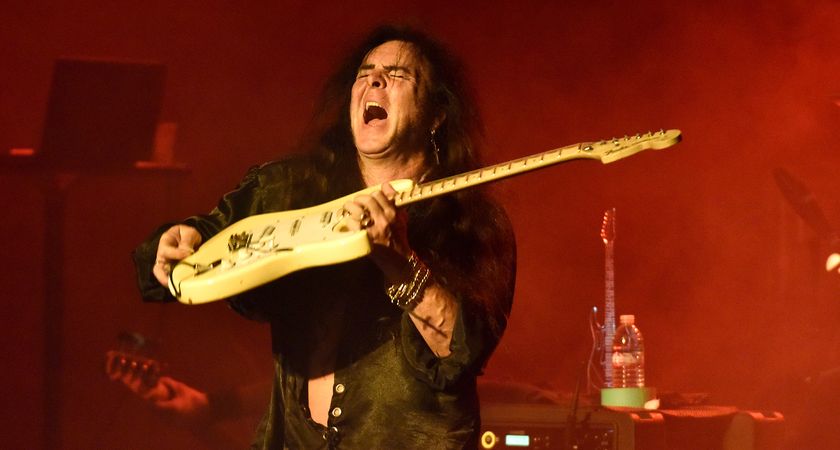
“Those arpeggios... That was the sickest thing I ever heard”: Yngwie Malmsteen on why guitarists should take inspiration from players of other instruments if they want to develop their own style
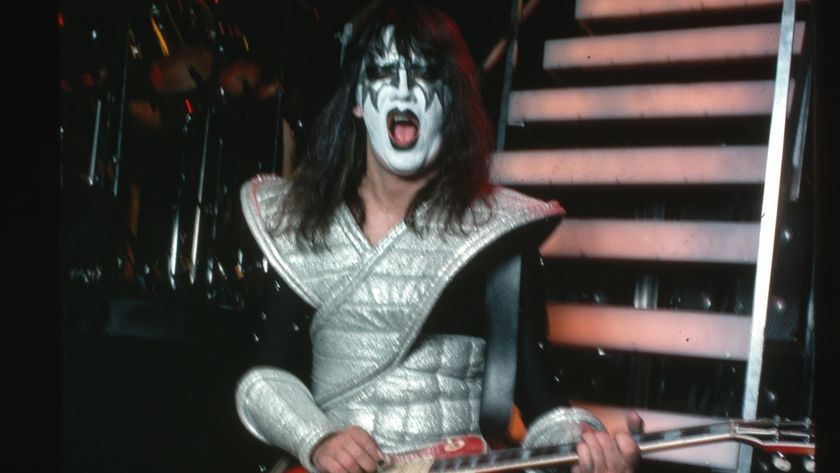
“I used a flange on the main riff and a wah-wah on the solo. I just said, ‘Hit the record button and I’ll let it rip!’”: Kiss legend Ace Frehley on his greatest cult classic song










